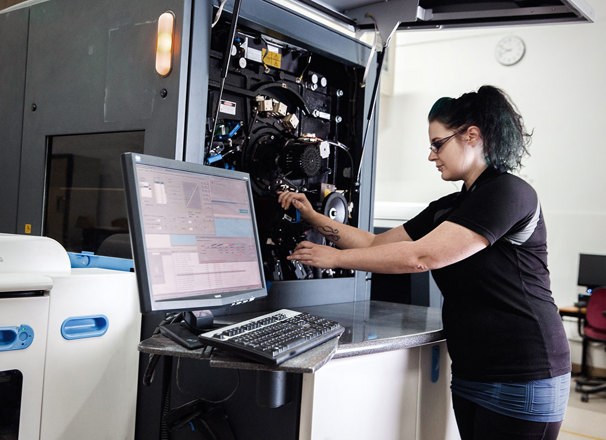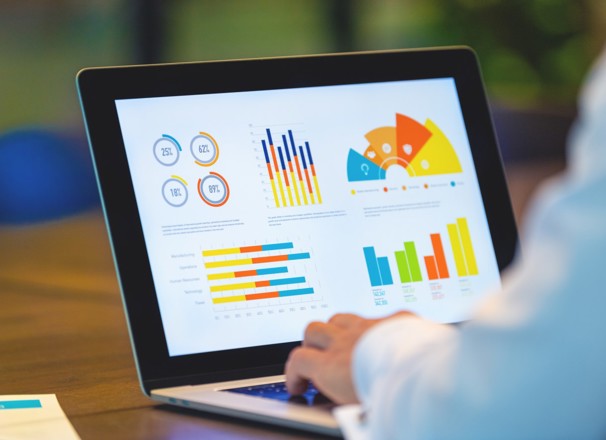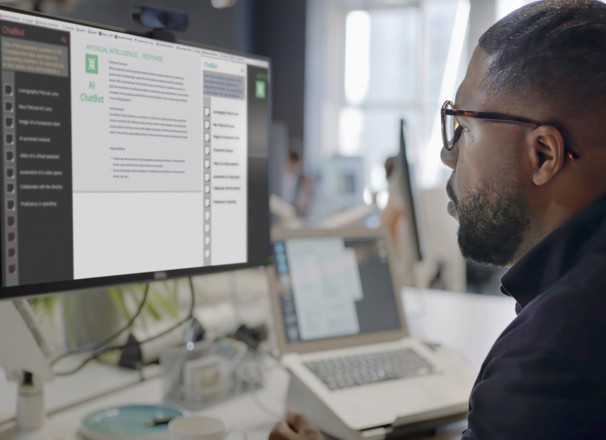Artificial intelligence (AI) software, like ChatGPT, is now a common tool in the workplace. AI can help complete daily tasks quickly—and make workdays more interesting.
Jump to:
- What is AI?
- What can AI tools do?
- What are the benefits of using AI at work?
- Are there any risks employees should know?
What is AI?
Generative AI is the latest version of AI technology. It powers tools like OpenAI’s ChatGPT, Google’s Bard, and Microsoft’s Copilot. It can be used to write, plan, review, help customers, and much more. There are even specific tools for creating images, like Microsoft’s Image Creator and OpenAI’s DALL·E 2.
AI can also be part of other software that you might use in your job. Customer relationship management platforms like Hubspot and Salesforce use AI, and companies use AI chatbots on their websites.
OpenAI says ChatGPT is used by employees at 80% of Fortune 500 companies. Research by KPMG discovered that 22% of Canadians are already using AI to help them in their jobs.
There’s a good chance that you have already used AI software at work or will have an opportunity to do so soon. AI will allow employees in many industries to do their jobs more efficiently. That means they will be able to spend more time on the interesting parts of their jobs or even learn new skills.
It’s a perfect time to learn AI skills. Let’s look at some of what AI can do and the benefits it can have for you.
What can AI tools do?
AI can perform complex tasks and also take care of boring, repetitive, or time-consuming activities. Here are some things AI can do in the workplace:
Find information
- Answer questions in a simpler way than search engines
- Gather information about customers
- Tell you about products or competitors
- Help you to learn a new skill
Create content
- Write emails, articles, scripts, ads, social posts, and product descriptions
- Create images for social media and marketing
- Brainstorm ideas and produce project outlines
- Write job descriptions
Analyze data, solve problems, and make predictions
- Talk to customers and help with customer problems
- Predict how customers will respond
- Tell you how you performed on a call
- Review resumés
Plan and organize
- Plan business trips and itineraries
- Plan marketing campaigns
- Schedule tasks and help with time management
- Plan driving or delivery routes and identify suppliers
- Act as a virtual assistant available any time
Remember, even though AI can perform these tasks, a human still needs to give instructions, protect data privacy, and check the work produced.
What are the benefits of using AI at work?
Increases productivity
AI-powered software is fast, and there’s usually no limit to how many times you can ask AI to perform a task. It can create entire emails in seconds, improve an email you have written, or add specific information.
It can also summarize a long document into a few short, important points. For example, ChatGPT can write social media posts for an event if you provide it with the event information, audience, and purpose. It can then help to create a promotional campaign and provide more ideas to make the event successful.
With AI completing basic tasks quickly, you will find more time to focus on quality. Say you have to write 20 emails—ChatGPT could give you the basic text. You can use the time saved to improve the emails with your expertise or add a personal message to each customer. You can also spend the time on your next task.
ChatGPT is also handy for time management. In fact, economists at the Organisation for Economic Co-operation and Development (OECD) have found that AI tools can handle scheduling better than humans.
Builds knowledge
Like search engines, AI can answer many questions. Instead of a list of results, ChatGPT will search many sources but provide a single answer to your request in a conversational way that’s easier to follow. This allows you to build knowledge quickly. You can also get immediate help with customer questions.
For example, if you need to know which of 3 meals has the fewest calories or most vitamins, you could have the answer in seconds. Or, if you sell a popular product, you can find technical details without searching in a manual.
Takes care of customers
Employers are using AI chatbots on websites to answer basic customer inquiries. You might have fewer customer calls to take, but when customers do call, you will have more time to help them, improving their experience.
Makes work more interesting
You may be seeing a trend: AI can quickly do boring, basic, and repetitive tasks. This allows you to spend more time problem solving, being creative, or performing the expert part of your job, making the day more interesting and enjoyable. The new skills you explore will help you progress in your career.
Offers convenience
It is convenient to have a virtual assistant at your fingertips so you don’t need to wait for a colleague to help with a task. AI isn’t an expert at everything, but it can reduce time spent searching websites or looking for documents.
Provides another point of view
What if you have written an email, drafted a marketing plan, or outlined an idea and want a second opinion before sharing it with your manager? AI can provide another point of view. It can also give you new ideas and even role-play dealing with difficult customers!
Builds future-ready skills
When AI helps with simple tasks, you can spend the extra time improving your skills in the parts of your job that AI can’t do. By using AI, you will quickly learn how to get the most out of this technology, which is a new job skill in itself.
What are the risks of using AI?
As useful as AI can be, it also has some risks. This technology is new and can get things wrong or make up information. This is called “hallucinating.” Learning how to provide AI tools with relevant instructions is a way to improve the quality of the results.
It’s also important to check AI outputs thoroughly for quality and accuracy. If AI writes an email or a social media post, you should read it to make sure it’s correct. If you are using data or statistics from AI, you can use the internet to check the accuracy. ChatGPT and other tools will provide citations or sources on request.
It’s also important not to share private company, customer, or financial information with public AI tools like ChatGPT or Copilot.
There are some more complex risks, too, such as the risk of bias and ethical concerns. If you think that the use of AI in your workplace might lead to biased answers, false information, or something more troubling, you should talk to your employer to make sure there are appropriate safeguards.
Not all employers have decided to use AI or to let their employees use AI. Often, they are worried about the risks. If you use AI at work, always make sure your manager knows.
On the positive side, many employers are providing AI training to employees—which means you can learn new skills to take forward in your career.




